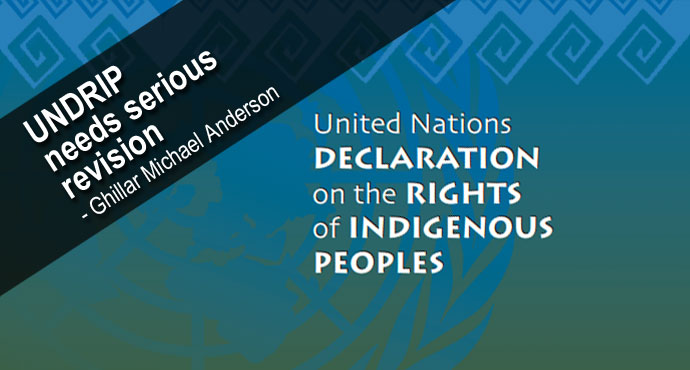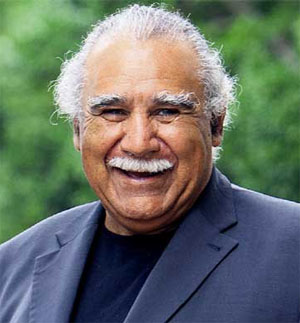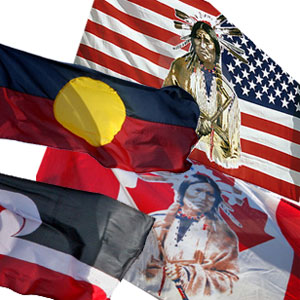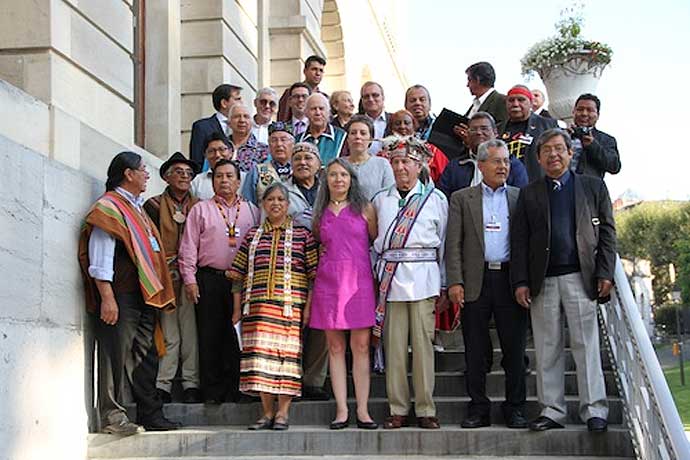'Declaration on the Rights of Indigenous Peoples' needs serious revision says Anderson on return from Geneva

8 December 2014

Ghillar Michael Anderson, Convenor and Joint Spokesperson of Sovereign Union of First Nations and Peoples in Australia, returned from Geneva this morning after attending an organisational meeting to bring together in 2015 the first delegates to the UN of the world's Indigenous Peoples. [The airbus he was on had to make an emergency landing in Perth.]
In a statement from Perth Anderson said:

Ghillar Micahael Anderson
(SU file image)
"It was from the first delegates' conference in July 1981 that the UN established the Working Group on Indigenous Peoples and it was from this body, over many years, that the UNDRIP, the Declaration on the Rights of Indigenous Peoples was formed.
"At the recent preparatory meeting held on 4th and 5th December in Geneva, Elders of 1977 and 1981 conferences decided that UNDRIP, the UN Declaration on the Rights of Indigenous Peoples, needs serious revision, because it does not truly reflect the political and legal position of First Nations Peoples around the world.
"The UNDRIP will become a significant point of discussion in June 2015 at the First Delegates Conference in Geneva, particularly in light of the fact that the existing international laws are much more forceful in according First Nations Peoples the right of self-determination; the right to their own identity, the rights to learn and maintain the languages; the legal right to own their own cultural heritage (something Australia denies it Aboriginal Peoples); and the right to clearly determine our own economic pathways and wealth.
"Economic independence is clearly being denied our Peoples in Australia, particularly when you look at ILUAs with mining companies, where people who have successfully had their Native title determined do not have a right to control their own economic benefits. Additionally, the money is frozen in trust accounts for 10 – 20 years.
"Another issue that will be a significant point of discussion in June 2015 will be permanent sovereignty over all natural resources.
"These are issues that are already in international law in various UN conventions, including the International Convention on the Elimination of All Forms of Racial Discrimination, the International Covenants on Economic, Social and Cultural Rights and on Civil and Political Rights; and the Universal Declaration of Human Rights.
"Also under discussion last week in Geneva was the fact that UNDRIP, when closely scrutinised, can be interpreted as being racially discriminatory, that is it gives us second class rights as opposed to having the primary human and legal rights promised to 'all Peoples' in UN Conventions.

CANZUS Alliance
Canada - Australia - New Zealand - USA
"The final and most significant point is the fact that UNDRIP reads as if we can only have these rights, if we recognise and do not challenge the integrity of the existing UN Member State whose borders we live in. On this matter I had discussions with Willie Littlechild (a prominent lawyer from Canada) and Delee Sambo, from the Arctic Circle and current chair of UN Permanent Forum on Indigenous Issues (UNPFII). Both commented to me that the question of territorial integrity should be read both ways, that is, whilst we cannot challenge the sovereignty of the UN Member States, they must respect and not challenge ours when we assert it.
"The key point here is the fact that the CANZUS alliance (Canada, Australia, New Zealand and the USA) still have difficulty with UNDRIP and refuse to recognise First Nations Peoples around the world as Peoples in their own right, something that puts fear into the hearts and minds of the colonial states like Australia and its parent country Britain.
"While we may see the UNDRIP as being a progressive aspirational document, it is not the whole answer to the things we need for future generations. Having been engaged in the formation of the terms of the Declaration I think we all understand that it does have a certain degree of international influence, but very few are happy with the outcomes document of the most recent World Conference on Indigenous Peoples in New York that lasted two hours with government-chosen speakers.
"For us another very important point we must think about here in Australia is – while we fight against constitutional recognition for fear of its political and legal ramifications, we must also be very careful about calling for a Treaty, because native Americans, Canadians and Maori are not at all happy with their treaty processes. Whilst they have certain rights recognised, they argue that the colonising State interprets the treaty in an opposite way to them. This is a situation we can find ourselves in if we do not have local, regional and State conventions on a Treaty or for that matter constitutional inclusion. If we are not carful we can give it all away, just like the Magnificent Seven did with the Native Title Act.
This is why our Unilateral Declarations of Independence (UDIs) and assertions of continuing sovereignty are so vital.
"[Coming home was not without surprises as the Airbus lost cabin pressure at 37000 feet in transit from Dubai to Sydney. The plane dived quickly to 8000 feet in order to level the air pressure in the cabins and then had to make a 4am unscheduled emergency landing in Perth.]”
Contact:
Ghillar Michael Anderson
Convenor and Joint Spokesperson of Sovereign Union of First Nations and Peoples in Australia and Head of State of the Euahlayi Peoples Republic
ghillar29@gmail.com - 0427 292 492 - www.sovereignunion.mobi

Historical Symposium on Indigenous Peoples at the United Nations Geneva, September 2013
Ghillar Michael Anderson, Sovereign Union Convenor (back row - second from right (red bandanna)

Historical Symposium on Indigenous Peoples at the United Nations, Geneva in 1981
Ghillar Michael Anderson (back row 2nd from right)

